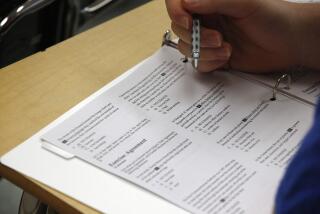Common Core: California can’t afford to forgo test data [Blowback]
In the coming weeks, Gov. Jerry Brown will likely sign AB 484, a measure that would put the state at odds with the Obama administration and risk $1.5 billion in federal funding by effectively suspending data collection on K-12 student achievement for the current school year as the state transitions to the Common Core curriculum.
What this effort doesn’t consider is that there are other crucial changes taking place in California’s education system, including different ways to allocate funding to schools. At this time of major change, a year without this data is unacceptable.
Three years ago, state legislators voted to replace the state’s K-12 Standardized Testing and Reporting (STAR) system with President Obama’s Common Core initiative. Common Core standardizes the testing and tracking of student performance across states. Assemblywoman Susan Bonilla’s (D-Concord) AB 484 would eliminate STAR testing for the current school year, making Common Core’s electronic testing optional for all school districts and suspending the public release of any student performance data collected this year (and potentially future ones).
On Monday, The Times’ editorial board argued that the state should provide pencil versions of the new Common Core test to districts lacking the necessary technology to administer the test electronically. We at California Common Sense agree.
But we disagree with The Times’ assertion that “one year without No Child Left Behind data is minor.” To the contrary, as the state introduces sweeping changes for K-12, we need more -- not less -- information to track the effectiveness of those untested and expensive changes.
AB 484 author Bonilla has argued that suspending testing while implementing Common Core would allow for a yearlong program trial “without there being any high stakes involved.” Actually, the stakes are already high.
This year alone, the state is implementing two major changes for California’s schools. In addition to the $1.25 billion it will spend on implementing Common Core, California will direct an additional $2.1 billion to school districts and charter schools for implementing the Local Control Funding Formula, a major redesign that would direct greater funding to districts with large low-income and English-learner populations.
The state wants to improve student performance among high-need districts in particular, but how can it do so precisely when it would stop measuring whether its new programs are actually working? And ironically, Bonilla’s opt-in system for testing would likely serve to inform us only on the lowest-need districts. The bill would effectively restrict Common Core testing to the state’s most well-resourced districts. Meanwhile, higher-need districts would likely be excluded.
Simply put, failing to track student performance this year would leave policymakers without critical data in arguably the state’s most important benchmark year for both major statewide education initiatives.
State Superintendent for Public Instruction Tom Torlakson argues that the $25 million spent annually to administer STAR tests would be more effective if redirected to implementing Common Core. But how significant is that $25 million when the state is already spending $1.25 billion on Common Core (not to mention the $59 billion total spent on California schools)? In fact, $25 million is a pretty good deal for the state to gain the data it needs to determine whether the $1.25 billion spent on Common Core is actually working.
Historically, Gov. Brown has not supported using performance data in school reform. In 2011, he vetoed SB 547, a bill to reform California’s K-12 accountability mechanisms. He argued that because the bill did not consider immeasurable factors like “character or love of learning,” its data-driven reforms were inherently flawed.
The governor does, however, support using student demographic data to determine how the state allocates funding to school districts. We should recognize that just as it is important to know to whom education dollars are going, in future years, it will also be important to know what, if any, impact those dollars will have had.
Measuring performance is essential for understanding how effectively our schools serve students, even more so in this year of major reform. California should establish this as its benchmark year and use the Common Core exam to test the state’s entire K-12 population. At this critical juncture, we cannot afford a year without performance data.
ALSO:
A new course for the L.A. River
The new Miss America is not a Muslim -- but so what if she were?
McManus: On foreign policy, a consistently inconsistent president
Jack Mosbacher is an analyst at California Common Sense, a nonpartisan, nonprofit group that conducts data-driven policy analysis and advocates for government transparency.
If you would like to write a full-length response to a recent Times article, editorial or Op-Ed and would like to participate in Blowback, here are our FAQs and submission policy.
More to Read
A cure for the common opinion
Get thought-provoking perspectives with our weekly newsletter.
You may occasionally receive promotional content from the Los Angeles Times.






